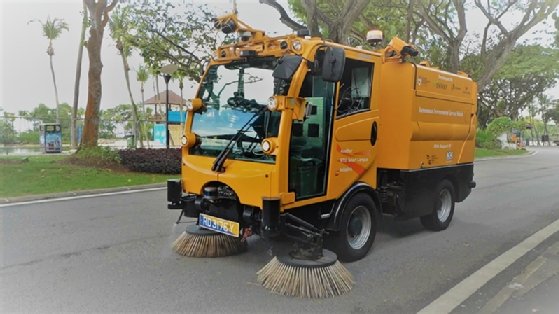
amornchaijj - stock.adobe.com
Singapore pulls ahead with public sector 5G trials
Singapore’s public sector organisations are testing the use of 5G connectivity to remotely operate an autonomous vehicle for road-sweeping, among other use cases
Singapore’s public sector agencies have begun 5G trials on the resort island of Sentosa in a bid to test the use of the next-generation mobile network in areas such as construction, manufacturing, healthcare and tourism.
A total of 10 trials are being conducted under the 5G@Sentosa project, with technology supplied by Singtel and the Government Technology Agency, which is leveraging its smart nation sensor platform to collect and analyse real-time information from a nationwide network of sensors and internet of things (IoT) devices.
Singtel’s multi-access edge compute (MEC) platform is also being used in the trials, which involve public sector organisations such as the Building and Construction Authority (BCA), the National Environment Agency (NEA), and institutions including Nanyang Polytechnic.
The NEA, for example, is working with Nanyang Technological University to remotely operate an autonomous vehicle for road-sweeping using 5G’s high-bandwidth and low-latency capabilities (see image below). The teleoperations initiative would enable an off-site operator to play the role of the on-board safety driver – a current requirement for autonomous vehicle trials in Singapore.
In construction, the BCA is testing the use of 5G-enabled autonomous robots with mounted 3D laser scanners for remote tracking of work progress. It is also trialling the use of head-mounted displays such as Microsoft’s HoloLens to help workers achieve geometry alignment during installation works.
To support the trials, Singtel is providing near-island-wide outdoor 5G coverage on the 3.5GHz spectrum, as well as seaward coverage to support drones and sea vessel trials. There is also a 28GHz millimetre wave site near one of Sentosa’s beaches at Palawan Green that will provide uplink bandwidth for applications such as teleoperations.

Bill Chang, CEO of group enterprise at Singtel, said the 5G@Sentosa project will enable government agencies to experience the advantages of high-speed, low-latency connectivity with network slicing and edge cloud capabilities through Singtel’s MEC platform, which also supports Microsoft’s Azure Stack and Amazon Web Services (AWS) Outposts.
It is uncertain whether any of the 5G@Sentosa trials involves the use of either hybrid cloud offering, but government agencies that already run applications on the two hyperscale cloud services could potentially deploy those applications on the MEC platform without additional programming.
Michael Ma, assistant chief executive at Sentosa Development Corporation (SDC), said that with its ecosystem of leisure experiences and business, Sentosa provides an ideal environment to implement innovative solutions under its Smart Sentosa initiative, in which it continuously explores innovative solutions for visitors and to support its operations.
Ma said Sentosa has hosted multiple test beds over the years, including an on-demand autonomous vehicle trial in 2019. At least 30 trials on 5G use cases will be conducted on the island by the first half of 2023, building on “Sentosa’s technological initiatives over the years and further cementing Sentosa’s position as a unique location for test beds”.
According to a recent global survey by EY, the Covid-19 pandemic has spurred greater interest in 5G, with three-quarters of organisations expecting 5G to help them reinvent their processes in the next five years.
5G investments among organisations in Asia-Pacific are also pulling further ahead than the Americas and Europe, with 78% of organisations in the region currently investing or planning to invest within the next two to three years, compared with 71% of organisations in both the Americas and Europe.
Meanwhile, 27% of Asia-Pacific organisations have signalled significantly greater interest in 5G and the IoT since the pandemic began, compared with 13% and 15% in the Americas and Europe, respectively.
Read more about 5G in APAC
- Singapore-based security firm Aetos will use Singtel’s multi-access edge computing platform to run applications such as surveillance robots, drones and video analytics at its security command centre.
- 5G will account for a fifth of mobile subscriptions by 2025 in Southeast Asia and Oceania, underscoring the keen adoption of emerging technologies in the Asia-Pacific region.
- Malaysia is speeding up 5G deployments through a “special purpose vehicle” that will receive 5G spectra, as well as build, operate and lease 5G infrastructure to new and existing telcos.
- After launching its 5G network last year, Globe Telecom in the Philippines is planning an aggressive roll-out schedule this year that will take advantage of technologies like cloud gaming.








